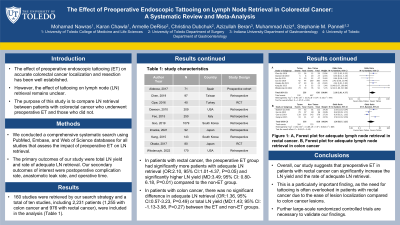Tuesday Poster Session
Category: Colorectal Cancer Prevention
P3201 - The Effect of Preoperative Endoscopic Tattooing on Lymph Node Retrieval in Colorectal Cancer: A Systematic Review and Meta-Analysis
Tuesday, October 24, 2023
10:30 AM - 4:00 PM PT
Location: Exhibit Hall

Has Audio

Mohamad Nawras, BS
University of Toledo College Medicine and Life Sciences
Toledo, OH
Presenting Author(s)
Award: Presidential Poster Award
Mohamad Nawras, BS1, Karan Chawla, MBA2, Armelle DeRiso, MS, MD3, Azizullah Beran, MD4, Muhammad Aziz, MD5, Stephanie M. Pannell, MD6
1University of Toledo College Medicine and Life Sciences, Toledo, OH; 2University of Toledo College of Medicine, Toledo, OH; 3University of Toledo, Sylvania, OH; 4Indiana University, Indianapolis, IN; 5University of Toledo, Toledo, OH; 6University of Toledo, Maumee, OH
Introduction: The effect of preoperative endoscopic tattooing (ET) on accurate colorectal cancer localization and resection has been well established. However, the effect of tattooing on lymph node (LN) retrieval remains unclear. The purpose of this study is to systematically compare LN retrieval between patients with colorectal cancer who underwent preoperative ET and those who did not.
Methods: We conducted a comprehensive systematic search using PubMed, Embase, and Web of Science databases from inception to 03/09/2023, for studies that assess the impact of preoperative ET on LN retrieval in patients with colorectal cancer. The primary outcomes of our study were average LN retrieval and rates of adequate retrieval as reported by the respective studies. We calculated weighted pooled odds ratio (OR) and mean difference (MD) with the corresponding 95% confidence intervals (CIs) for all outcomes using the random-effects model. A P-value < 0.05 was considered statistically significant. To assess heterogeneity, we used the Higgins I2 index, where an I2>50% implied significant heterogeneity.
Results: A total of 10 studies, including 2231 patients with colorectal cancer (699 who underwent preoperative ET and 1532 who did not), were included in the analysis. Six studies reported total LN yield in a continuous manner and showed significantly higher LN yield in the tattooed group (MD:2.61; 95% CI: 1.01-4.21, P=0.001, Figure 1A). Seven studies reported the number of patients with adequate LN retrieval in a dichotomous manner and showed a significantly higher number of patients with adequate LN retrieval in the tattooed group (OR:1.89, 95% CI:1.08-3.32, P=0.03, Figure 1B). However, subgroup analysis revealed that both outcomes were statistically significant only in patients with rectal cancer, and not in patients with colon cancer.
Discussion: Our meta-analysis suggests that preoperative ET is associated with increased LN retrieval in patients with colorectal cancer, and specifically with rectal cancer. Further large-scale and more extensive randomized control trials are necessary to validate our findings.

Disclosures:
Mohamad Nawras, BS1, Karan Chawla, MBA2, Armelle DeRiso, MS, MD3, Azizullah Beran, MD4, Muhammad Aziz, MD5, Stephanie M. Pannell, MD6. P3201 - The Effect of Preoperative Endoscopic Tattooing on Lymph Node Retrieval in Colorectal Cancer: A Systematic Review and Meta-Analysis, ACG 2023 Annual Scientific Meeting Abstracts. Vancouver, BC, Canada: American College of Gastroenterology.
Mohamad Nawras, BS1, Karan Chawla, MBA2, Armelle DeRiso, MS, MD3, Azizullah Beran, MD4, Muhammad Aziz, MD5, Stephanie M. Pannell, MD6
1University of Toledo College Medicine and Life Sciences, Toledo, OH; 2University of Toledo College of Medicine, Toledo, OH; 3University of Toledo, Sylvania, OH; 4Indiana University, Indianapolis, IN; 5University of Toledo, Toledo, OH; 6University of Toledo, Maumee, OH
Introduction: The effect of preoperative endoscopic tattooing (ET) on accurate colorectal cancer localization and resection has been well established. However, the effect of tattooing on lymph node (LN) retrieval remains unclear. The purpose of this study is to systematically compare LN retrieval between patients with colorectal cancer who underwent preoperative ET and those who did not.
Methods: We conducted a comprehensive systematic search using PubMed, Embase, and Web of Science databases from inception to 03/09/2023, for studies that assess the impact of preoperative ET on LN retrieval in patients with colorectal cancer. The primary outcomes of our study were average LN retrieval and rates of adequate retrieval as reported by the respective studies. We calculated weighted pooled odds ratio (OR) and mean difference (MD) with the corresponding 95% confidence intervals (CIs) for all outcomes using the random-effects model. A P-value < 0.05 was considered statistically significant. To assess heterogeneity, we used the Higgins I2 index, where an I2>50% implied significant heterogeneity.
Results: A total of 10 studies, including 2231 patients with colorectal cancer (699 who underwent preoperative ET and 1532 who did not), were included in the analysis. Six studies reported total LN yield in a continuous manner and showed significantly higher LN yield in the tattooed group (MD:2.61; 95% CI: 1.01-4.21, P=0.001, Figure 1A). Seven studies reported the number of patients with adequate LN retrieval in a dichotomous manner and showed a significantly higher number of patients with adequate LN retrieval in the tattooed group (OR:1.89, 95% CI:1.08-3.32, P=0.03, Figure 1B). However, subgroup analysis revealed that both outcomes were statistically significant only in patients with rectal cancer, and not in patients with colon cancer.
Discussion: Our meta-analysis suggests that preoperative ET is associated with increased LN retrieval in patients with colorectal cancer, and specifically with rectal cancer. Further large-scale and more extensive randomized control trials are necessary to validate our findings.

Figure: Forest plots for LN yield and adequate LN retrieval in patients with colorectal cancer receiving preoperative ET
Disclosures:
Mohamad Nawras indicated no relevant financial relationships.
Karan Chawla indicated no relevant financial relationships.
Armelle DeRiso indicated no relevant financial relationships.
Azizullah Beran indicated no relevant financial relationships.
Muhammad Aziz indicated no relevant financial relationships.
Stephanie Pannell indicated no relevant financial relationships.
Mohamad Nawras, BS1, Karan Chawla, MBA2, Armelle DeRiso, MS, MD3, Azizullah Beran, MD4, Muhammad Aziz, MD5, Stephanie M. Pannell, MD6. P3201 - The Effect of Preoperative Endoscopic Tattooing on Lymph Node Retrieval in Colorectal Cancer: A Systematic Review and Meta-Analysis, ACG 2023 Annual Scientific Meeting Abstracts. Vancouver, BC, Canada: American College of Gastroenterology.

